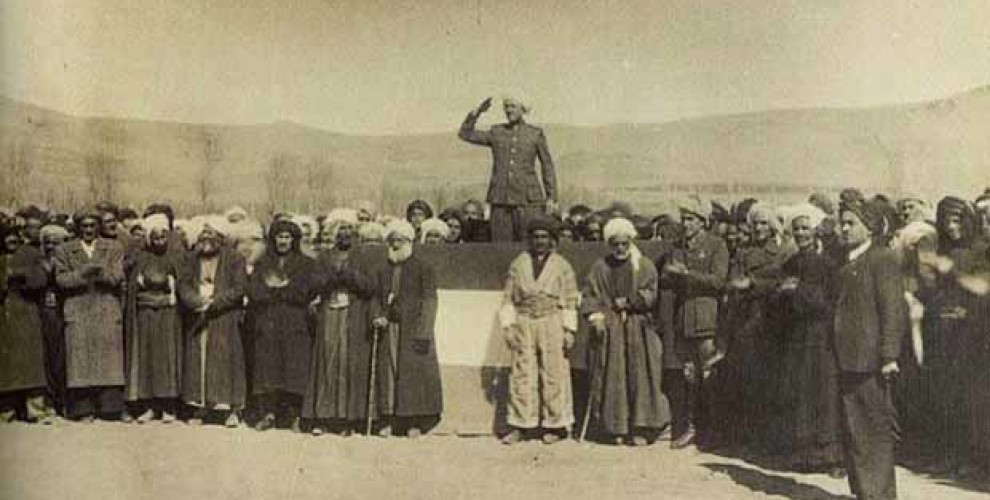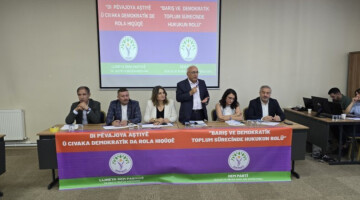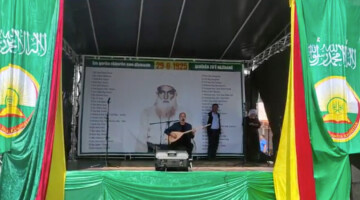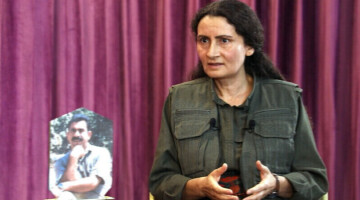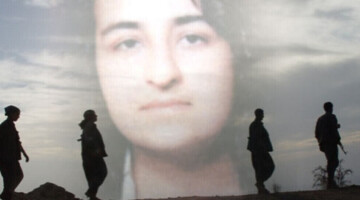The days when today’s resistance for freedom started in Afrin, the westernmost part of Kurdistan, mark -of no coincidence- the anniversary of the days when Qazî Mihemed heralded to the Kurdish people the founding of the Mahabad Republic in the Çarçira Square, the easternmost part of Eastern Kurdistan, 71 years ago.
“History is hidden in today, we are at the beginning of history.” This quote by Kurdish People’s Leader Abdullah Öcalan speaks of these days. To look back, to rebuild history, and to avoid the “repeat” cycles.
Just as Kurds blossom the steps to freedom, leaning on their own strength and consciousness, and march on with the new way of life they formed to determine their own fate. All peoples should feed off of their own history, and memory should remain fresh with hope and with resilience, but necessary lessons should also be taken from history, saluting those who pay the price of identity and dignity.
The days when the great resistance started in Afrin, located on the westernmost part of Kurdistan, against the invasion also mark the anniversary of a date that is decidedly not a coincidence. The descendants of Qazî Mihemed who never forgot the experience of freedom 71 years ago in Mahabad, the other end of Eastern Kurdistan, build the citadels of resistance with the lessons they took.
RUSSIA REFRESHES HISTORIC MEMORY IN AFRIN
Speaking of the anniversary of Mahabad, remembering Afrin is inevitable, and so is mentioning the dirty negotiations Russia held 71 years ago that continues over the Kurds’ legitimate struggle for freedom today. Without a doubt, all forces that have waged a war of hegemony over the region can be analyzed separately, as much as the 4 colonialists states, but for Kurds the dirty negotiations Russia makes with Turks in Afrin has already gone down in records as a memory refresher that had been experienced a long time ago already.
BUT KURDS TOOK LESSONS FROM HISTORY
What was Soviet Russia’s role in the fall of Mahabad and the hanging of Qazî Mihemed in the Çarçira Square? Looking at the 11 month long period -a short time in history, a long time in the memory of a people- from the declaration to the fall of the self governance experience in Mahabad, the easternmost part of Kurdistan, one can see that the tricks played in Afrin, the westernmost part of Kurdistan, are a repeat. With one difference though: Kurds have taken many lessons in the 71 years since, and now they know very well their friends and their enemies.
HEADING INTO WWII
In the third year of WWII (1941), Iran’s Shah Riza’s sympathy for the rising Hitler fascism turned Soviet Russia and the UK into allies to invade Iran. (The true reason for this alliance for Russia was to strengthen their standing in the Caucasus and to achieve more influence in the Middle East, while for the UK it was to uphold their position in Asia and gain control of Iranian and Iraqi oil - but that is not the subject here, so we have to move on.) In the end, on August 25, 1941, the UK intervened from the south and Soviet Russia intervened from the north.
RIGHT TO SELF DETERMINATION
This foreign intervention created a good opportunity for Rojhilat (Eastern Kurdistan). Kurds held meetings with Russia who defended (!) “nations’ right to self determination”. A meeting with all Kurdish organizations in Rojhilat was held on September 4, 1942 to achieve inner unity. The administration of the time in Turkey, who say today that they “won’t repeat the mistakes made in the north of Iraq in the north of Syria”, they “don’t want a terror corridor on (their) border” and embark on another unresolvable war with Kurds, sent a telegram to London on September 2, 1941 and warned the UK that the Kurds organizing was a “threat”.
HEVPEYMANA SÊSÎNOR
In the process of organization after the foreign intervention, on August 16, 1943, the Komeleyê Jinêweyê Kurdistan (Kurdistan Resurrection Society) was founded. In August 1944, three Kurdish organizations -Komela, Xoybûn and Hêvi- signed the Peymana Sêsînor (Three Borders) treaty on the Dinbanbar Mountain to unite forces. From there they sent letters to Kurds in other parts for support. In the diplomatic arena, visits to Azerbaijan and the Kurdistan-Soviet Cultural Relations Society founded in Soviet Russia (April, 1945) were important steps.
QAZÎ MIHEMED'S LEADERSHIP
Qazî Mihemed was from one of the educated-intellectual families known for their patriotism in Mahabad, and him joining Komele gave the organization more power. Qazî Mihemed’s uncle Fetah Qazî had lost his life in the war against Russia in 1916, and his grandfather Şêx Mişeyix had fought against the UK, bringing Kurdish clans together in Diwander in 1930. Qazî Mihemed’s family was also considered to have religious authority, and he became one of the important leaders of Komele in a short time.
Kurds in Rojhilat who had been influenced by the foundation of Democratic Parties suggested by Lenin to the European left formed the Iran Kurdistan Democratic Party (IKDP) on August 25, 1945. The Party was comprised of three main veins (which would later play a role in the fall of the Mahabad Kurdish Republic): The intellectual and urban circles in Komele, the feudal Bey’s and urban, left-leaning secular youth.
DECLARATION OF THE REPUBLIC IN ÇARÇIRA
After the Azeri Democratic Party declared autonomy in Tabriz on January 12, 1945, with partial weapons support received from Soviet Russia, Qazi Mihemed declared the republic in the Çarçira Square in Mahabad on January 22, 1946. Qazî Mihemed spoke to the people from the Çarçira Square: “I swear to Allah, on the Kurdish nation and on the sacred Kurdistan flag that I will defend the independence of Kurdistan and the republic to the last drop of my blood and to the last breath I draw.” The republic’s capital was Mahabad, it comprised of 7 provinces and had a cabinet of 13 ministers and a parliament of 30 MPs.
TRIAL IN SELF GOVERNANCE
The young state’s president was Qazî Mihemed, the Prime Minister Hacî Babê Şêx, the Defense Minister Seyfî Qazî, the Propaganda Minister Sidîq Heyderî, the Education and Culture Minister Menaf Kerimî, the Interior Minister Mihemed Emîn Muînî, the Health Minister Seyid Mihemed Eyûbyan, the Economy Minister Ehmed Îlahî, the Labor Minister Xelîl Xusrewî, the Mail and Telegram Works Minister Kerîm Ehmedyan, the Commerce Minister Hacî Mistefa Dawudî, the Justice Minister Mela Husên Mecidî, the Agriculture Minister Mihemed Welîzade, the Foreign Minister Hacî Ebdulrehman Îlxanîzade and the Transportation Minister Îsmaîl Îlxanîzade. The cabinet was formed with a balance policy in mind, with prominence from clans.
LANGUAGE AND CULTURE EFFORTS
After the flag for Mahabad was determined, a national anthem was composed from the poem Ey Reqîb written by Kurdish poet Yunis Dildar in 1938. The young republic prioritized propaganda through the newspapers Kurdistan and Niştiman, journals Hawar and Agir, the Helale journal published by women and the Mahabad Radio. In the printing presses founded in Mahabad, poetry books by Hêjar and Hêmîn were printed, and world classics were translated into Kurdish. Kurdish was made the official language, and primary school education was made mandatory. The Kurdish Bards Institute was founded. Regular army regiments were formed and a serious mobilization for institutionalization was launched.
INNER CONFLICT AMONG KURDISH CLANS
As all these were happening, the inner conflict among Kurdish clans was Mahabad’s Achilles heel. Many historians say the Kurdish Bey’s in Mahabad looked down on Qazî Mihemed and called him “a cadi on payroll, an imam, an urbanite without a clan”. Just like allegations by certain Kurdish circles against Rojava and its administration today. Clans who couldn’t get rid of their inner conflicts were holding various meetings with Tehran at the same time. Iran did not let any of these conflicts among Kurds pass. Even before the republic was founded, a clan leader named Emîr Esad was invited to Tehran and declared the Governor of Mahabad. He was given an official vehicle and returned to Mahabad with it. But the people didn’t accept this, which was significant, and he had to resign. How very like the Kurds who speak the tongue of the hegemons and do deals with them!
QAZÎ MIHEMED WAS AWARE OF THESE WEAKNESSES
Qazî Mihemed was a man who knew the sociology of the Kurds well. That is why he prioritized education and always stressed the spirit of unity. There are stories that one day Qazî Mihemed was in a meeting with some 15 Kurdish Beys in his home. As the tea was about to be served, he went into the kitchen and said, “However many Beys there are, bring that many staff, holding that many trays with separate teas, and serve them all at the same time.” When asked why he did that, Qazî said, “Whoever received the tea first others would look for a meaning behind it, or would ask why they didn’t receive it before.” This story gives important insight into the sociology of the day.
Historians point out that another handicap of the republic was that the borders were kept narrow. For instance, the republic not expanding to the south of Urmia and the Saqiz province where Kurds and Azeris lived together was generally dubbed a mistake. A republic that would extend into Kermanshah, Sine, Ilam and other provinces would be able to break free of the narrow borders and achieve a larger population, resulting in more strength.
SOVIETS WITHDREW, IRAN ATTACKED
The Shah-ruled Iran started to conspire with the US and Iraq, and their appeal to the UN by late 1946 for border violations was accepted by the votes of the UK and the US. Later on, the Soviets withdrew from Iran in return for the oil in the north of Iran and in the Caspian Sea. Leaning on the US, Iran first turned towards Azerbaijan and disbanded the autonomy and killed their leaders. After some Kurdish clans abandoned Qazî Mihemed and Mela Mistefa Barzanî, who provided the military force of Mahabad, withdrew to Soviet Russia, the regime turned on Mahabad. Qazî Mihemed agreed to turn himself in, in return for a promise that “the city wouldn’t be destroyed and the people wouldn’t be killed”, on January 17, 1946.
SAME NEGOTIATIONS
Russia is forcing the Kurds into the vice “either the regime or Turkey” today in Afrin. They were negotiating with the Kurds over the Caspian oil 70 years ago, and today they are trying to negotiate over Kurds in return for the Turkish Current project. As such, after the attacks on Afrin began, Russian company Gazprom Chairperson Alexey Miller said they received permission from the Turkish government through diplomatic channels for the construction of the coastal second arm of the Turkish Current natural gas pipeline, and that efforts continue. This is certainly just a detail, but there is no denying that very dirty negotiations are being made over Kurds.
QAZÎ MIHEMED'S RESPONSE
After Qazî Mihemed was arrested, he was put on trial in a court similar to the Istiklal (Independence) Courts in Turkey used in the Şêx Seîd serhildan. How similar is Court Chair Parsî Tebar’s comment of “You made yourself into a tool for the enemy” to the comments about Afrin today that it is “part of the Syrian Arab Republic”! But Qazî Mihemed’s response sheds light on today as well: “Where were you when the enemy came? I hosted many of your soldiers in my home, I fed them. But you ran away. Don’t speak such empty words. (...) Death that comes on the path for the people and for freedom is a sweet death for us, we consider it an honor. And I swear you will not hear me sigh even as you execute me.”
LEGACY FOR ALL KURDS
Qazî Mihemed was executed on March 30, 1947 along with Defense Minister Seyfi Qazî and his brother Sadri Qazî, in the Çarçira Square where the republic had been declared. This part in his will is still relevant for the Kurds on the way to victory: “O Kurdish people! My people under tyranny and oppression! I am in the final hours of my life. For Allah’s sake, don’t be enemies to each other anymore, stand shoulder to shoulder, stand against the tyrant enemy and all tyrants. Don’t give yourself away to the enemy. The Kurdish people have many enemies, and they are vile and ruthless. The symbol of success for all nations is unity, cooperation and solidarity. A people who can’t achieve unity and have harmony will always be subjected to oppression by the enemy. (...) The enemy wants you as long as you serve its needs, after it’s done, it won’t give you mercy, it won’t forgive you. If you stand united, if you don’t give in to envy, if you don’t sell yourself to the enemy, you will be saved.”

